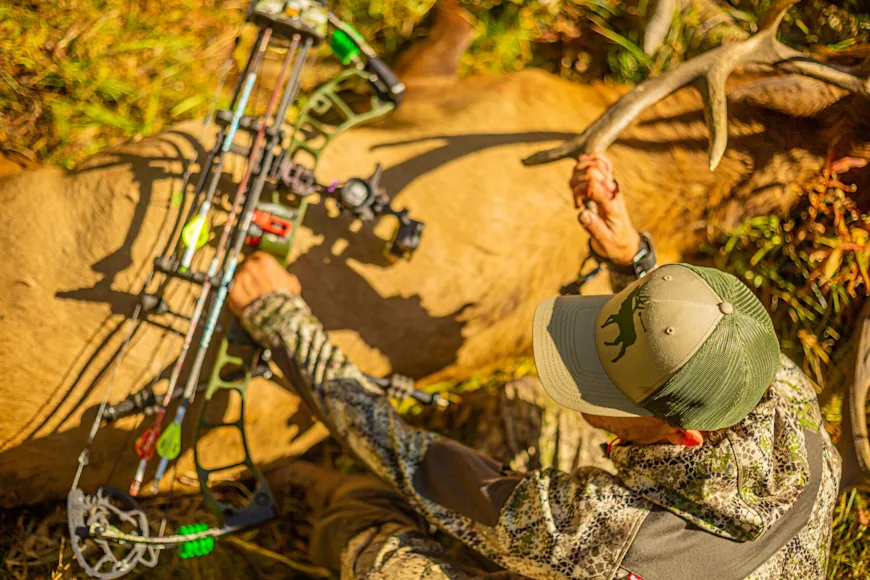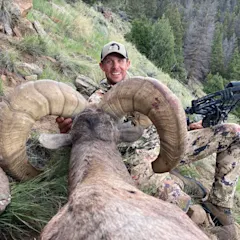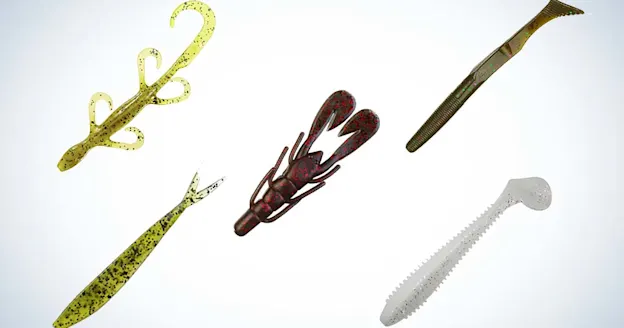We may earn revenue from the products available on this page and participate in affiliate programs. Learn more ›
Picking out broadheads for elk is more important than you may think. After all, in the exciting world of bowhunting, it’s hard not to get caught up in today’s racy compound rigs, fancy-to-do sights, toothpick-thin hunting arrows, and fall-away arrow rests that all but tune themselves. However, don’t forget about the broadhead you plan to thread into your arrow’s insert—especially if you’re hunting muscular, big-boned creatures like elk.
The fact is, some broadheads perform better than others. There is no need to get into the fixed vs. mechanical vs. hybrid debate. Yeah it’s a fun one to go ’round-and-’round with a buddy on, but it won’t help anyone make an informed buying decision. I’ve killed elk with all three styles of heads. All will get the job done if you’re shooting the right broadhead in its respective category—durable, sharp, and accurate. Yes, I have my favorites, and I opt for certain broadhead makes and models over others because of confidence. Confidence is everything in bowhunting, and my best broadheads for elk have proved lethal repeatedly.
Best Overall: SEVR Titanium 1.5 Mechanical
Best Fixed-Blade: QAD Exodus
Best Hybrid-Style: New Archery Products DK4
Best Mechanical: Rage Hypodermic NC +P
Best Crossbow: G5 Montec M3
How I Picked The Best Broadheads for Elk
Simple, I’ve shot a lot of broadheads. During my bowhunting tenure, I’ve conducted multiple broadhead tests. Each of the broadheads mentioned in this article has been used in the field while hunting elk, and they’ve all been tested thoroughly on the range.
The attached-to-the-arrow broadhead is what cuts through the air and impacts the animal. The design—whether it’s a mechanical, fixed-blade, or a popular modern-day hybrid—will directly affect its performance. If the ferrule is weak, arrow penetration will be halted and energy lost. And whether the head sports two, three, or four blades, those blades must be surgical sharp. If they are dull and brittle, more energy and penetration are lost.
The ultimate goal for any bowhunter, especially when hunting a big animal like an elk, is maximum penetration. The more penetration, the more damage the broadhead blades can do as they track behind the carbon shaft. Penetration matters—two lungs are always better than one—and the back of the liver and out behind the opposite shoulder is a better combo than just the liver. The more vital organs you take out, the more trauma and blood loss.
The Best Broadheads for Elk: Reviews & Recommendations
Best Overall: SEVR Titanium 1.5 Mechanical

SEVR Titanium 1.5 Mechanical sevrbroadheads
Specs
1.5-inch cutting diamater
100- and 125-grain head options
Ideal for low-poundage shooters
Maximum penetration
Pros
Lock-and-Pivot Blades pivot around bone as needed
Practice Lock means you can practice with the same head you plan to hunt with
Stretch Cut creates massive wound channels
Titanium Ferrule promises durability
Cons
$15.99 per head
Direct-to-consumer only
SEVR Nation is growing, and it’s not because the broadhead looks like a little missile attached to carbon. The popularity of these heads comes from their field-point-like accuracy and massive cut trauma—the swept-back blade cutting angle smashes organs and works in concert with the Lock-and-Pivot design to ensure maximum penetration. I love the second hole in the titanium ferrule that allows for a small (comes with each head) set screw that holds the blades in place and allows the bowhunter to practice with the same broadhead they plan to take afield.

SEVR’s Titanium 1.5 mechanical broadhead is growing in popularity thanks to a nearly field point level of accuracy. The group shown is from 100-yards. Jace Bauserman
And aside from the fact that I’ve killed my last three elk with this broadhead from distances of 18, 31, and 62 yards at many different angles—the 62-yard shot was severely quartering away—these SEVR Titanium broadheads heed the rugged, accurate, and sharp call. The broadhead stays whisper quiet in flight, and while some will chastise me for awarding a mechanical design as the “Best Overall,” it’s my duty to do so.
Best Fixed-Blade: QAD Exodus & Muzzy Trocar
It’s not often I have a tie—an instance where my years of testing and experience can’t slap the best label on a single product—but this is one of those times.
QAD Exodus

QAD Exodus cabelas
Specs
Replaceable blades
85-, 100-, 125-grain options
1.25-inch cutting diamater
.040-inch blade thickness
Pros
Steep cutting angle for maximum penetration
Compact design promotes downrange accuracy.
Rock-Buster Hardened SST Tip
Razor-sharp .040-inch thick blades
Cons
Not field-point accurate past 50 yards
This manufacturer (QAD) is a perfectionist, and good things happen when you get engineers that fret over every little detail. For a fixed-blade broadhead, the Exodus is as compact as they come, and a compact build enhances broadhead durability and accuracy.
Another win of this three-blade organ carver is the B.O.S. (Blade Over Shaft) technology. Because the blades sweep back over the shaft, the specs of the Exodus are more like a field point. Another notable feature is the steep cutting angle. Most shooters drift from a fixed-blade because they want more prominent entrance and exit holes. Though the Exodus is labeled with a 1 1/4-inch cutting diameter, the steepness of the blades produces a cut that will rival that cut rating. The broadhead penetrates like crazy, slicing wounds and pulling them open, which creates great blood trails.
Muzzy Trocar

Muzzy Trocar cabelas
Specs
100-grain option
.035-inch thick blades
1 3/16-cutting diameter
Replaceable blades
Pros
Right helical SS Blades boost accuracy
Trocar Tip
Razor sharp
Tough as nails
Deep penetration
Cons
Almost $45 for a pack of 3
The Muzzy Trocar is an elk killer. This three-blade honey is durable and penetrates incredibly well. And though each of the three blades are vented, which traditionally leads to lesser accuracy, this fixed-blade is as accurate as they come. No, not field-point accurate beyond 50 yards—you should always practice with the broadhead you plan to hunt with—but the head does promote good accuracy when your bow is tuned correctly and sighted in for the head.
Overall, it’s an ultra-strong broadhead. This three-blade fixed head sports a solid one-piece SS ferrule and right offset blade design, which was added to give the Trocar better downrange accuracy, and it did. The Trocar tip is a rock—you can’t break it—and the compact design promotes remarkable downrange flight.
Best Hybrid-Style: New Archery Products DK4

New Archery Products DK4 New Archery Products
Specs
Fixed/Mechanical blade technology
100- and 125-grain options
Compound and crossbow models are available
1 3/4-inch cutting diameter
Pros
Main blades pivot around the bone
Massive entrance/exit wounds
Field point accurate
No O-rings, collars or rubberbands
Cons
Durability can be an issue
Some heads have some grain discrepancy.
The big idea behind a hybrid-style broadhead is that bowhunters get the best of both worlds: a guaranteed two-blade fixed-cut with the addition of mechanical blades. Early models were clunky and flew like garbage, but slim new designs like the DK4 are compact and fly exceptionally well downrange. The blades are reasonably sharp, and though the primary two blades are in a fixed position, they can pivot around bone.
I’ve killed several big-game critters, including a few elk, with NAP broadheads like the Killzone and Spitfire XXX. NAP broadheads get the job done and typically don’t break the bank. The DK4 will run you about $30 for a 3-pack.
Best Mechanical: Rage Hypodermic NC +P

Rage Hypodermic NC +P cabelas
Key Features
100- and 125-grain options
.035-inch thick blades
1.75-inch cutting diamater
No collar blade lock
Pros
Field point accurate
Durable
Cut like crazy
Narrow profile for increased penetration
Cons
Pricy
Shoot a rage through an elk, and you’ll know. The .035-inch thick blades are scary sharp, and though the broadhead looks fresh out of another Schwarzenegger Terminator movie, I promise it does the job on elk. It flies like a field point, and I’ve shot the head side-by-side with field points well beyond 100 yards during practice sessions.
It’s a slim, sleek killer branded with a 1 3/4-inch cutting diameter, I promise you the exit wound will look like you can put your fist in it. This two-blade shooter needs no collar or O-rings; the blades stay contained in the ferrule until impact, and the +P features the lethal Hypodermic hybrid tip. The tip’s narrow profile and needle-like swept-back blade design help the broadhead drive deep into the game. Blood trails with this broadhead are borderline silly.
Best Crossbow: G5 Montec M3

G5 Montec M3 cabelas
Specs
100 percent spin tested
1 1/16 inch cutting diamater
Cut on contact design
Pros
100 percent Steel Tough
Diamond Cut Sharpness
One-Piece MIM Construction
Cons
Ballistic Match Practice Point is available but not included
The blades aren’t vented, which boosts downrange accuracy, and helps reduce the whistle effect associated with most fixed-blade broadheads. The 100 percent Steel Tough construction will hammer through bone, and the High-Speed Crossbow model is available in 100-grains.
If you’re looking for a one-piece broadhead that’s accurate, tough, sharp, and ultra-quiet in flight, the M3 is a solid choice. Crossbows produce a ton of speed, and this 1 1/16-inch cut fixed-blade handles that speed easily. The ferrule snugs tight to the bolt’s insert, and this broadhead is offered in 100- and 125-grain options for the vertical bowhunter. You won’t find blades any sharper.
What To Consider When Choosing Broadheads for Elk
Broadheads are expensive, and like so many products in the archery industry, the broadhead market is flooded with options.
Start by doing your research. Look at what the Instagram and Facebook elk killers are using—pay less attention to celebs pushing products and more to those who seem to get a public land bull every year. Independent broadhead tests. Also, don’t get caught up in the “fixed-blade only” for elk hype. I will never again shoot a fixed-blade broadhead at an elk or any animal. Mechanical designs have come too far, and they have proven their worth for me in the elk mountains time and time again. With that noted, I have two buddies that only shoot fixed-blade heads for elk and kill bulls yearly. Like I said, it’s all about confidence. Shoot what works for you.
On that note, don’t overlook your favorite deer crusher, either. If you have a broadhead that fills you with confidence, or one that fills your freezer each fall, it may be your go-to for elk. If a broadhead works for you, then it works for you. It doesn’t matter if it works for anyone else or if you’ve heard horror stories. When I started shooting Rage broadheads over 12 years ago for mule deer, guys repeatedly warned me about the design. Guess what? I killed some monster plains muleys with the old-school 2-inch cut Rage. You want to shoot a head that gives you confidence.
Lastly, though most states allow the use of mechanical broadheads for elk — Idaho just came on board — be sure the specs of your elk broadhead line up with the regulations in your chosen elk state.
FAQs
Q: Which broadheads are best for elk?
The ones that kill them. Seriously, though, this is the truth. If you’re shooting a top-end modern-day broadhead that sports a robust build that is sharp and accurate, and you put that broadhead through the lungs of a giant bull, that bull will expire quickly.
Q: What is the best broadhead arrow weight for elk?
Many guys will go from a 100-grain broadhead to a 125-grain broadhead for elk hunting. I get adding weight to the arrow. However, I prefer to stay with a standard 100-grain broadhead. I practice with 100-grain field points all year, and I’m not a fan of changing things up for one animal when I don’t see a ton of benefit. The 64-yard bull I alluded to earlier in this article was quartering hard away, and I sent a 100-grain SEVR 1.5 through the back of his liver, front of his stomach, and dumped it right behind his front shoulder. That’s all the proof I need.
Q: Are Rage Broadheads good for elk?
Most of them are, and I’ve killed elk with Rage Broadheads. However, avoid any Rage branded with a cutting diameter over two inches. Also, stay away from broadheads with a light aluminum ferrule.
Q: What is the best fixed-blade broadhead for elk?
As noted above, I like QAD’s Exodus and Muzzy’s Trocar. Another great head, though I haven’t spent enough time testing it in the field and the woods, is Iron Will’s Single Bevel.
Q: What are the best broadheads for bowhunting?
If I had to shoot one broadhead for the rest of my bowhunting life at every animal I hunted, it would be SEVR’s Titanium 1.5. Last season, I killed two gagger whitetail bucks with the head and, from a distance of over 60 yards, blew completely through a Rocky Mountain Big Horn Sheep.
Q: What is the best budget broadhead for elk?
I purposefully didn’t list a budget broadhead for elk in this article, and I believe there is no such thing. Elk are giant creatures, and if you work and earn your opportunity at a public land bull, the last thing you want on the end of your arrow is a broadhead with a “budget” label. Regarding broadhead choice for elk, shoot the best head that gives you insane confidence.
Best Broadheads for Elk: Final Thoughts
Best Overall: SEVR Titanium 1.5 Mechanical
Best Fixed-Blade: QAD Exodus
Best Hybrid-Style: New Archery Products DK4
Best Mechanical: Rage Hypodermic NC +P
Best Crossbow: G5 Montec M3
Regardless of what broadhead you drop cash on, please take one of those broadheads and practice with it from the farthest distance you feel comfortable harvesting an elk, and at every distance of five and 10 yards between. Don’t believe packages that promise field-point accuracy. You must prove the accuracy of the broadhead, and this doesn’t include shooting a practice broadhead that comes with or was purchased in addition to the broadhead you chose. Practice broadheads are splendid; most do hit right with the real thing. Still, when you earn an opportunity at a bull elk, you want to know with absolute certainty that your bow will deliver that arrow-broadhead combination exactly where your pin is floating.
Why Trust Us
For more than 125 years, Field & Stream has been providing readers with honest and authentic coverage of outdoor gear. Our writers and editors eat, sleep, and breathe the outdoors, and that passion comes through in our product reviews. You can count on F&S to keep you up to date on the best new gear. And when we write about a product—whether it’s a bass lure or a backpack—we cover the good and the bad, so you know exactly what to expect before you decide to make a purchase.






